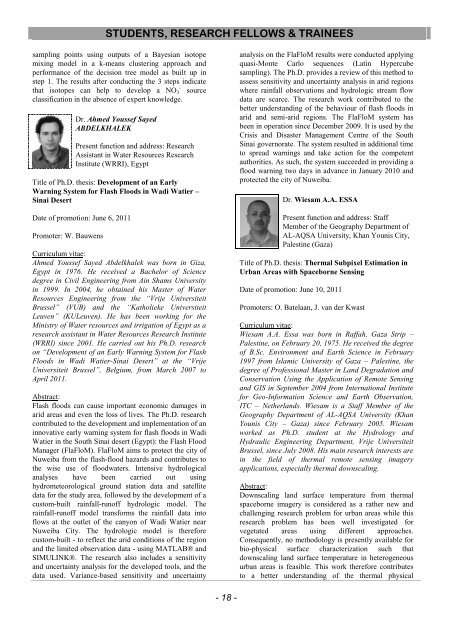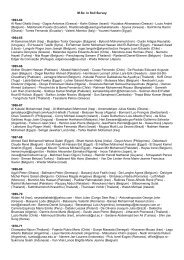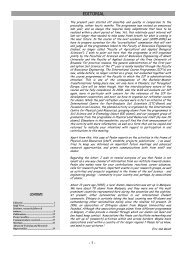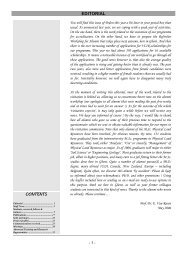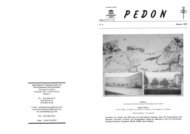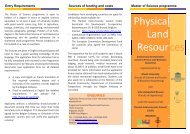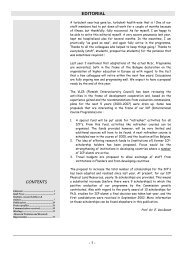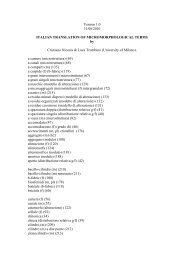Pedon 23 - Physical Land Resources - Universiteit Gent
Pedon 23 - Physical Land Resources - Universiteit Gent
Pedon 23 - Physical Land Resources - Universiteit Gent
You also want an ePaper? Increase the reach of your titles
YUMPU automatically turns print PDFs into web optimized ePapers that Google loves.
STUDENTS, RESEARCH FELLOWS & TRAINEES<br />
sampling points using outputs of a Bayesian isotope<br />
mixing model in a k-means clustering approach and<br />
performance of the decision tree model as built up in<br />
step 1. The results after conducting the 3 steps indicate<br />
-<br />
that isotopes can help to develop a NO 3 source<br />
classification in the absence of expert knowledge.<br />
Dr. Ahmed Youssef Sayed<br />
ABDELKHALEK<br />
Present function and address: Research<br />
Assistant in Water <strong>Resources</strong> Research<br />
Institute (WRRI), Egypt<br />
Title of Ph.D. thesis: Development of an Early<br />
Warning System for Flash Floods in Wadi Watier –<br />
Sinai Desert<br />
Date of promotion: June 6, 2011<br />
Promoter: W. Bauwens<br />
Curriculum vitae:<br />
Ahmed Youssef Sayed Abdelkhalek was born in Giza,<br />
Egypt in 1976. He received a Bachelor of Science<br />
degree in Civil Engineering from Ain Shams University<br />
in 1999. In 2004, he obtained his Master of Water<br />
<strong>Resources</strong> Engineering from the “Vrije <strong>Universiteit</strong><br />
Brussel” (VUB) and the “Katholieke <strong>Universiteit</strong><br />
Leuven” (KULeuven). He has been working for the<br />
Ministry of Water resources and irrigation of Egypt as a<br />
research assistant in Water <strong>Resources</strong> Research Institute<br />
(WRRI) since 2001. He carried out his Ph.D. research<br />
on “Development of an Early Warning System for Flash<br />
Floods in Wadi Watier-Sinai Desert” at the “Vrije<br />
<strong>Universiteit</strong> Brussel”, Belgium, from March 2007 to<br />
April 2011.<br />
Abstract:<br />
Flash floods can cause important economic damages in<br />
arid areas and even the loss of lives. The Ph.D. research<br />
contributed to the development and implementation of an<br />
innovative early warning system for flash floods in Wadi<br />
Watier in the South Sinai desert (Egypt): the Flash Flood<br />
Manager (FlaFloM). FlaFloM aims to protect the city of<br />
Nuweiba from the flash-flood hazards and contributes to<br />
the wise use of floodwaters. Intensive hydrological<br />
analyses have been carried out using<br />
hydrometeorological ground station data and satellite<br />
data for the study area, followed by the development of a<br />
custom-built rainfall-runoff hydrologic model. The<br />
rainfall-runoff model transforms the rainfall data into<br />
flows at the outlet of the canyon of Wadi Watier near<br />
Nuweiba City. The hydrologic model is therefore<br />
custom-built - to reflect the arid conditions of the region<br />
and the limited observation data - using MATLAB® and<br />
SIMULINK®. The research also includes a sensitivity<br />
and uncertainty analysis for the developed tools, and the<br />
data used. Variance-based sensitivity and uncertainty<br />
analysis on the FlaFloM results were conducted applying<br />
quasi-Monte Carlo sequences (Latin Hypercube<br />
sampling). The Ph.D. provides a review of this method to<br />
assess sensitivity and uncertainty analysis in arid regions<br />
where rainfall observations and hydrologic stream flow<br />
data are scarce. The research work contributed to the<br />
better understanding of the behaviour of flash floods in<br />
arid and semi-arid regions. The FlaFloM system has<br />
been in operation since December 2009. It is used by the<br />
Crisis and Disaster Management Centre of the South<br />
Sinai governorate. The system resulted in additional time<br />
to spread warnings and take action for the competent<br />
authorities. As such, the system succeeded in providing a<br />
flood warning two days in advance in January 2010 and<br />
protected the city of Nuweiba.<br />
Dr. Wiesam A.A. ESSA<br />
Present function and address: Staff<br />
Member of the Geography Department of<br />
AL-AQSA University, Khan Younis City,<br />
Palestine (Gaza)<br />
Title of Ph.D. thesis: Thermal Subpixel Estimation in<br />
Urban Areas with Spaceborne Sensing<br />
Date of promotion: June 10, 2011<br />
Promoters: O. Batelaan, J. van der Kwast<br />
Curriculum vitae:<br />
Wiesam A.A. Essa was born in Raffah, Gaza Strip –<br />
Palestine, on February 20, 1975. He received the degree<br />
of B.Sc. Environment and Earth Science in February<br />
1997 from Islamic University of Gaza – Palestine, the<br />
degree of Professional Master in <strong>Land</strong> Degradation and<br />
Conservation Using the Application of Remote Sensing<br />
and GIS in September 2004 from International Institute<br />
for Geo-Information Science and Earth Observation,<br />
ITC – Netherlands. Wiesam is a Staff Member of the<br />
Geography Department of AL-AQSA University (Khan<br />
Younis City – Gaza) since February 2005. Wiesam<br />
worked as Ph.D. student at the Hydrology and<br />
Hydraulic Engineering Department, Vrije <strong>Universiteit</strong><br />
Brussel, since July 2008. His main research interests are<br />
in the field of thermal remote sensing imagery<br />
applications, especially thermal downscaling.<br />
Abstract:<br />
Downscaling land surface temperature from thermal<br />
spaceborne imagery is considered as a rather new and<br />
challenging research problem for urban areas while this<br />
research problem has been well investigated for<br />
vegetated areas using different approaches.<br />
Consequently, no methodology is presently available for<br />
bio-physical surface characterization such that<br />
downscaling land surface temperature in heterogeneous<br />
urban areas is feasible. This work therefore contributes<br />
to a better understanding of the thermal physical<br />
- 18 -


